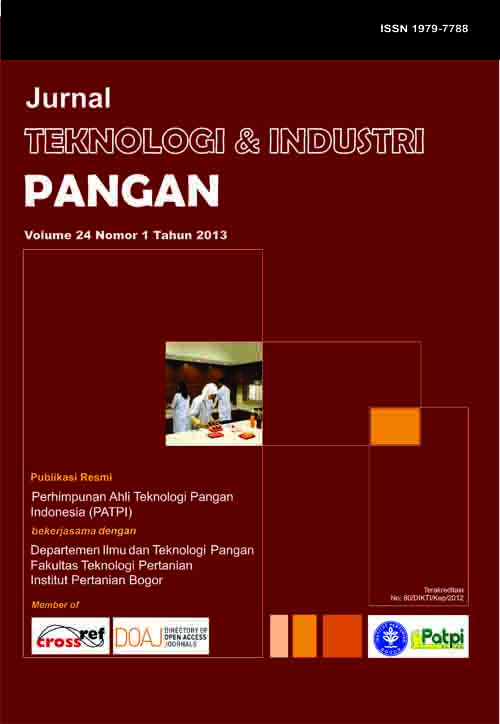CHARACTERISTICS OF SOYMILK ADDED WITH DRAGON FRUIT AND EGGPLANT PEEL EXTRACTS [Karakteristik Susu Kedelai dengan Penambahan Ekstrak Kulit Buah Naga dan Kulit Terong]
Abstract
Soymilk has become progressively consumed in Indonesia since early 1990. However, soymilk has a short shelf life due to its high protein content that promotes growth of spoilage microorganisms. This study was aimed at utilizing peel waste of eggplant (Solanum melongena L.) and dragon fruit (Hylocereus polyrhizus), to prolong shelf life of fresh soymilk through microbial growth inhibition, so that it will not be easily contaminated during storage, transportation and distribution time to meet the needs of consumers. Microbiological analysis showed a notably higher inhibitory effect of dragon fruit peel extract when soymilk was stored at 4ºC and it exhibited lower number of colonies even after 6 days. Interestingly, the antimicrobial activity of eggplant peel extract in cold soymilk could only be observed on day 3 until day 9. Hence, it is assumed that chlorogenic acid, as a primary antimicrobial agent in eggplant peel, needed certain time interval to activate its inhibitory activity against microorganism. However, the two peel extracts could not prolong the shelf life of soymilk stored at ambient temperature. All soymilk samples added with the peel extracts fulfilled the Indonesian National standards (SNI) for pH value, protein, and total solid content. Based on the sensory evaluation, the samples with dragon fruit peel extract attained a comparable acceptance level as plain soymilk and were favored over those added with eggplant extract. In conclusion, this research indicated potential applications of usual household waste of dragon fruit and eggplant peels as antimicrobial agents for protein-rich beverages.

